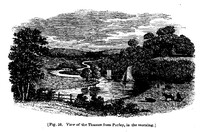As properly belonging to this chapter, may be mentioned a curious observation, which occurred in the view of the Thames, from PURLEY. In the morning [see fig. 50], when the sun was in the east, the landscape appeared to consist of wood, water, and distant country, with few artificial accompaniments; but in the evening, when the sun was in the west, objects presented themselves which were in the morning scarcely visible. In the first instance, the wood was in a solemn repose of shade, the water, reflecting a clear sky, was so brilliantly illuminated, that I could trace the whole course of the river; the dark trees were strongly contrasted by the vivid green of the meadows, and the outline of distant hills was distinctly marked by the brightness of the atmosphere. I could scarcely distinguish any other objects; but these formed a pleasing landscape, from the breadth or contrast of light and shade.
In the evening the scene was changed; dark clouds reflected in the water rendered it almost invisible, the opposite hanging wood presented one glare of rich foliage; not so beautiful in the painter's eye, as when the top of each tree was relieved by small catching lights: but the most prominent features were the buildings, the boat, the path, the pales, and even the distant town of Reading, now strongly gilded by the opposite sun. [See fig. 51.] On comparing this effect with others, which I have frequently since observed, I draw this conclusion: that certain objects appear best with the sun behind them, and others with the sun full upon them; and it is rather singular, that to the former belong all natural objects, such as woods, trees, lawn, water, and distant mountains; while to the latter belong all artificial objects, such as houses, bridges, roads, boats, arable fields, and distant towns or villages. In the progress of this work I shall have occasion to call the reader's attention to the principles here assumed, and which, in certain situations, are of great importance, and require to be well considered.
[Purley, Berkshire, belonged to J. Ant. Storer]

